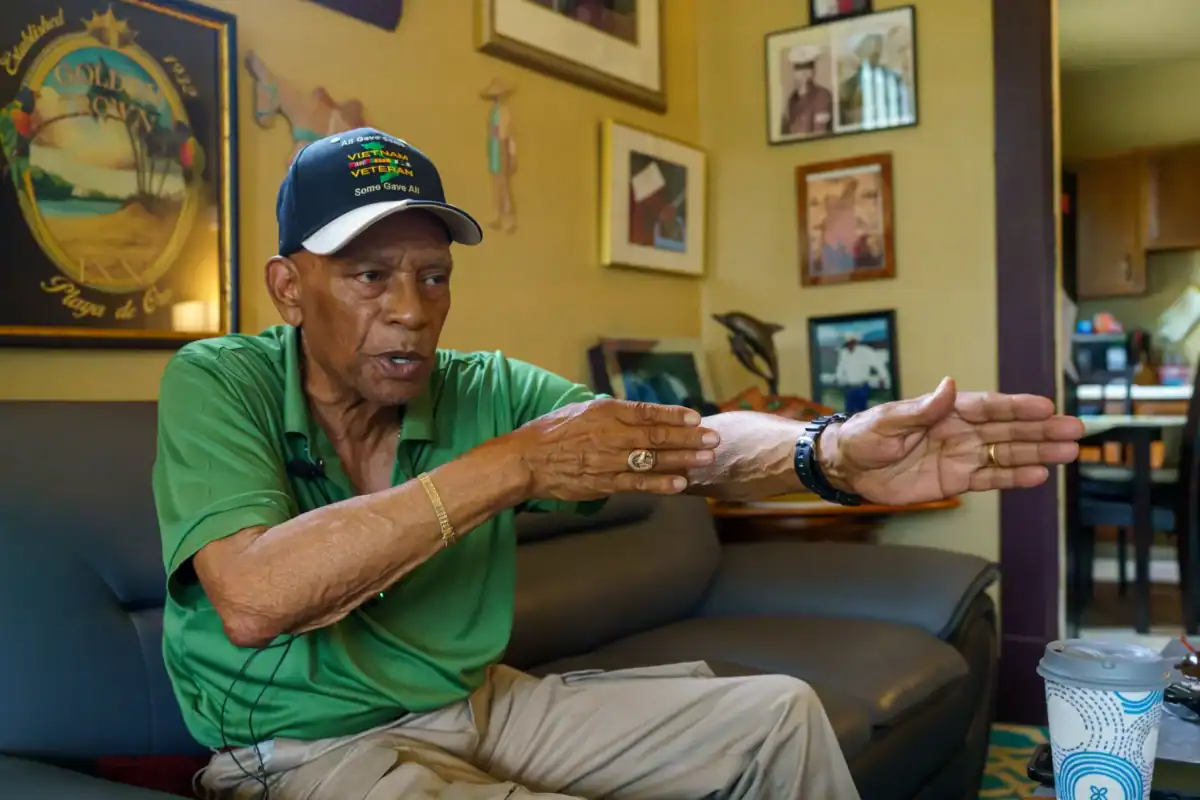By Mary Kate McNamee
Walter Collins, a Vietnam veteran from Northeast Ohio, has spent the past decade turning his service into advocacy for fellow veterans. Through Cleveland’s Rid-All Green Partnership and a community housing initiative in Union Miles, Collins works to address invisible wounds like post-traumatic stress disorder (PTSD) and traumatic brain injuries. His efforts highlight the urgent need for resources that support veterans’ mental health and community reintegration.
A Veteran’s Invisible Wounds
“A veteran that you see trying to cross the street with an amputated leg or an amputated arm …if you see that veteran trying to cross the street… the odds are you are going to try and help them, well you have veterans also that are trying to cross the street. they have invisible wounds, they have wounds up in the brain,” Collins said.
While returning or trying to adjust to everyday civilian life, many veterans may face PTSD. According to the U.S. Department of Veterans Affairs, 7 out of every 100 veterans will have PTSD. “People don’t seem to understand the importance of dealing with invisible wounds just as much as you deal with visible wounds,” Collins said.
A Local Inspiration
Mark Silverberg, a Cleveland resident, has worked with Collins for a year and a half. Silverberg, upon immediately meeting Collins, thought he was an interesting guy and began working on a documentary highlighting Collins ‘achievements.
“One of the things that I learned, against all odds, some folks find their gifts and stick to their values; they can accomplish amazing things, and Walter is certainly an example of that,” Silverberg said.
Silverberg mentioned how Collins’ service extended beyond his time in Vietnam. “He took that experience of service, and turned it into service for other veterans since he came home,” Silverberg said.
Action Over Affirmations
Collins’ work goes beyond his words and advocacy, working with Rid-All Green Partnership, located in the Kinsman neighborhood of Cleveland. Rid-All Green Partnership took an abandoned piece of land and developed it into a functioning farm, providing residents with fresh local produce.
Randall McShepard, Co-Founder of Rid-All Green Partnership, shared that Collins has worked with this farm since 2014. Rid-All Green Farm holds classes for adults, adolescents, and veterans, providing them with a healthy outlet. McShepard reflected on Collins’ partnership and impact on the farm:
“(With) Walter, being a very proud and active veteran, and advocate for veteran issues, we learned that veterans coming through our training program, they were becoming very connected to the farm, they felt like they didn’t just want to leave after their training was done they wanted to remain, a lot of them were dealing with PTSD,” McShepard said.
Building Spaces for Healing
According to McShepard, Collins had also been advocating for housing for veterans, as well as urging veterans to participate in urban agriculture. Veterans feel the farm offers a rewarding experience.
“Through the efforts of Walter Collins and some of our staff, we actually built a hoop house dedicated to veterans. We call it the Veterans Hoop House… It’s like a drop-in center, where they can come and just have quiet time, volunteer, they can plant, or whatever else they may want to do,” McShepard said.
Celebrating and Supporting Veterans
Celebrating and recognizing veterans doesn’t end there. Collins, along with the farm, has held four Armed Forces Day celebrations. “We brought out numerous agencies that have helped veterans, for an all-day fair, where veterans can come out and get the help/ resources they need…Walter has driven that,” McShepard said.
Collins’ relentless advocacy for homelessness has resulted in raising money for a veteran housing facility in the Union Miles neighborhood, working along with the Rid-All Green farm once again.
Honoring a Cleveland Hero
Collins continues to inspire those in the community, continuously taking steps to not only advocate for veterans but to propel them on a path towards healing.
Considering Other Perspectives
While Collins’ work has earned admiration, some observers note that grassroots projects like Rid-All’s Veterans Hoop House cannot replace the scale of federal and state programs. National veterans organizations have pointed out that larger systemic reforms and consistent funding are still necessary to address widespread issues such as homelessness, mental health care access, and long-term housing stability.
These critiques emphasize that while community-driven solutions provide vital support, they must be complemented by a broader government investment.
“Walter Collins is a one-of-a-kind national hero who happens to be right living here in Northeast Ohio. He deserves to be celebrated and acknowledged,” McShepard said.
Community Impact
The impact of Collins’ advocacy is felt across Cleveland. His work with Rid-All connects veterans to agriculture, reducing isolation and helping them build new skills.
The Veterans Hoop House offers a safe place for reflection, social connection, and healing. Housing initiatives in Union Miles address immediate needs while promoting long-term stability.
By tying veterans’ well-being to the health of the community, Collins demonstrates how local action can complement larger systemic efforts.
His example shows that when veterans are supported, entire neighborhoods benefit through stronger connections, healthier lifestyles, and shared purpose.
Mary Kate McNamee studies English literature and history at Ohio University. She writes for her campus newspaper and was a summer intern with the Cleveland Observer.





